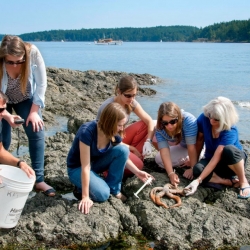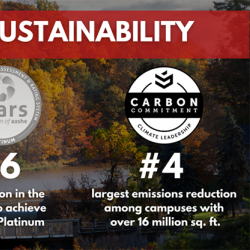Campus Sustainability News
News on campus sustainability initiatives, emerging programs, rankings, awards, student initiatives, green teams, and more from across the Cornell University campus.

Carolyn Finney, author of “Black Faces White Spaces: Reimagining the Relationship of African Americans to the Great Outdoors,” and scholar-in-residence at the Franklin Environmental Center at Middlebury College, will give a lecture about her nationally recognized work to increase awareness of how privilege shapes who gets to inform and determine policy and action on environmental issues. It is offered in partnership with Ithaca Children’s Garden, The Learning Farm, U.S. Fish and Wildlife, and the Finger Lakes Land Trust, and takes place virtually on Thursday, February 25, 2021, at 6 p.m. It is free and open to the public on Zoom; pre-registration required.

A live virtual event focused on preventing future pandemics, recognizing that human health is inextricably linked to the health of wildlife, livestock and the environment, will be moderated by New York Times journalist Thomas L. Friedman with a keynote address from noted naturalist Jane Goodall. The webinar, titled “Emerging Disease, Wildlife Trade and Consumption, and the Need for Robust Global Governance: Exploring Ways to Prevent Pandemics,” will take place Feb. 23 from 9 a.m. to noon and is co-hosted by the College of Veterinary Medicine, the World Wildlife Fund and the Cornell Atkinson Center for Sustainability.

The 2021 Climate Change Series provides a range of perspectives on the science of climate change and its implications for agriculture, ecosystems, and food systems and offers significant economic, ethical, and policy insights. “This seminar series brings in the brightest minds from across the world in different disciplines to understand the difficulty and complexity of climate change and the innovations already in progress to solve this problem," says Professor Peter Hess, who leads the seminars.

Cornell is teaming up with climate justice leaders to build sustainability efforts across the University community, reviving its commitment to the environment in light of the pandemic and worldwide movements for racial and social equality. In collaboration with the New York Coalition for Sustainability in Higher Education and Ithaca College, Cornell hosted the 2020 State of New York Sustainability Conference in December, featuring well-known figures in the science community, including Bill Nye ’77, Sen. Rachel May (D-N.Y.) and marine biologist and conservation expert Dr. Ayana Elizabeth Johnson.

A Cornell engineer is advancing the field of ‘multi-sector dynamics’ with a new $1.4 million grant from the U.S. Department of Energy that will focus on techniques for better projecting the outcomes of human interactions with the natural world. As scientists and policy makers increasingly turn toward mathematical modeling to help inform their decision making, the project aims to better predict how human systems – such as the economy, urbanization, technology, and agriculture – co-evolve with Earth systems, such as climate, natural resources and wildlife.

The Campus Sustainability Office is hiring a graduate or highly qualified undergraduate student to become our AASHE Sustainability Tracking, Assessment, and Rating System (STARS) Student Coordinator. Paid position can be completed remotely during COVID19 conditions and begins late Spring '21 or Summer '21, with the possibility to extend through the following school year. Cornell is the only Ivy to earn a STARS Platinum rating for our campus' sustainability performance. Help us maintain it.

The conference featured three days of problem-solving workshops, such as finding ways to engage students with the United Nations’ Sustainable Development Goals.

Sarah Brylinsky, who works in the Campus Sustainability Office, said she sees the current pandemic as a time where innovation for sustainability can thrive and make Cornell a model for other universities. “[I am] confident that Cornellians … are destined to help us create a future in which our choices as a society are overall better across each of sustainability’s areas of focus — including learning from the current global challenges to help inform a new future,” Brylinsky said.

As it turns 10, Cornell Atkinson Center for Sustainability is celebrating its accomplishments while focusing with renewed urgency on creating more powerful ways to translate knowledge into action. The stakes have never been higher.

The University swept top spots in national sustainability rankings for the 2020 year after being recognized as one of the most sustainable higher education institutions by the Sierra Club, Princeton Review, AASHE's Sustainability Tracking, Assessment & Rating System, and the Carbon Commitment run by Second Nature.
